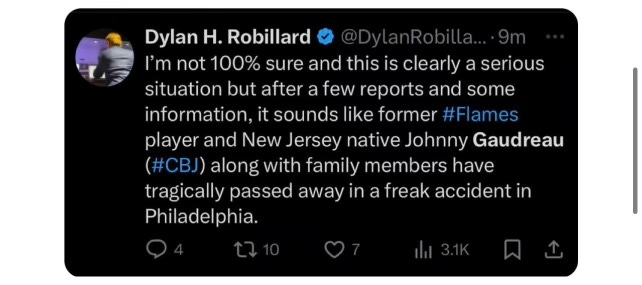When breaking news is broken
You'll never win an award for being first to report that someone died
There’s a media story that came out of the tragic death of Columbus Blue Jackets star Johnny Gaudreau last week.
The night of the accident, before the story was confirmed, a writer for Flyers Nitty Gritty, a Philadelphia sort of, kind of reported that Gaudreau and his brother had been killed.
The reporter was fired for his Tweet, and has since apologized.
Here’s a screengrab of the Tweet.
The Tweet is bad. We can all agree on that, right? It’s not good.
But it’s worth unpacking this a bit. Not to pick on or criticize the author at all but rather to use it as a teaching moment. If we all have this intuitive understanding that this is wrong, this instinctive “eech” reaction to it, why is that?
Because the Tweet is true, right? It’s not falsely reporting somebody’s death. It’s certainly not libelous. The news was widely reported a few hours later.
So what is it? Why does this feel so clearly wrong?
Let’s start with those first few words. “I’m not 100 percent sure …” And then later on, “it sounds like …” Because those are words and phrases that are antithetical to reporting news, right? The late Jim Kelley’s column writing advice echoes in my head here: don’t write what you think, write what you know.
If I’m putting on my idealistic journalism professor hat, I never want anyone to report or publish something they’re not 100 percent sure of.
But one of the defining aspects of digital journalism as practiced is the idea that Sue Robinson coined Journalism as Process. This is the idea that views journalism as an on-going, two-way conversation between the media and the audience, rather than just the acts performed by reporters and editors. In this view, journalism is not a product (the story or the daily paper) but the process (the constant flow of information). The nature of how we consume news in 2024 is as it happens, in bits and pieces. I wrote this about sports journalism a decade ago: The model I learned in school of “gather, sort, report” has evolved to “gather, report, sort.” There’s no value judgment here, it’s just how digital news evolved.
The language of the post is noteworthy too. “I’m not 100 percent sure” and “It seems that.” We see that language in reporting, both in sports and elsewhere too. You see it in the vague language of “I’m hearing that …” or “it’s not a done deal, but …”
Of course, it’s one thing to be not 100 percent sure that Kevin Broadus is going to be hired as the new Binghamton University men’s basketball coach and still write a story.
It’s another to say that about someone being alive or dead.
And that, of course, is the issue here. It’s obvious, but we still need to say things that are obvious. Reporting on whether or not someone is alive or dead is one of the most sacred things we in the media do. It’s like the one thing you can’t get wrong.1
Of course, the journalist here didn’t get it wrong. He was right.
So what else is going on here?
I learned about this story from my wife, who sent it (and the Tweet) to me. We had a really great conversation about this, as she played Devil’s Advocate for the sake of a conversation. A lot of what I’ve teased out here comes from our talk abpout this..
She asked me, “When you were 22 and this had happened, would you have Tweeted that? I think you would have.” She wasn’t being accusatory or mean when she said this.
And I paused for a second to think it over.
“No, I wouldn’t have.” I said. “Because I would have called Chuck (Pollock) or Charlie (Jaworski) and they would have told me to wait and confirm it.”
That’s the value of a great editor. That direction. That experience. That gravitas. That necessary check on a writer. I wonder if we’re losing that too much these days.
And that Tweet, it feels kind of flip, doesn’t it? The vague language, the use of the phrase “freak accident,” the “You guys …” vibe it gives off. That’s fine for a lot of the news we report. But when you’re talking about a literal matter of life or death, the tone combined with the uncertainty makes it feel wrong.
I always come back to this point: Breaking news can win you a lot of awards and get you a lot of promotions. But there’s no award you’ll win, no promotion you’ll get, by breaking news that somebody died.
Look, I’m not in the business of defending TMZ, but there’s a reason why when they are first to report a celebrity death, it’s always true. Because as much as they trade in rumors and speculation and gossip, they also know that if they get one of those wrong, they’re toast.




Excellent piece, very much enjoyed that breakdown. Well thought out!
Brian, I enjoy reading you, but you don't have to use the phrase "let's unpack this" every single time you write something. Media speak is awful. You should consider staying away from it. You are allowed to talk like a normal human being. At least you don't use, "sent shockwaves."